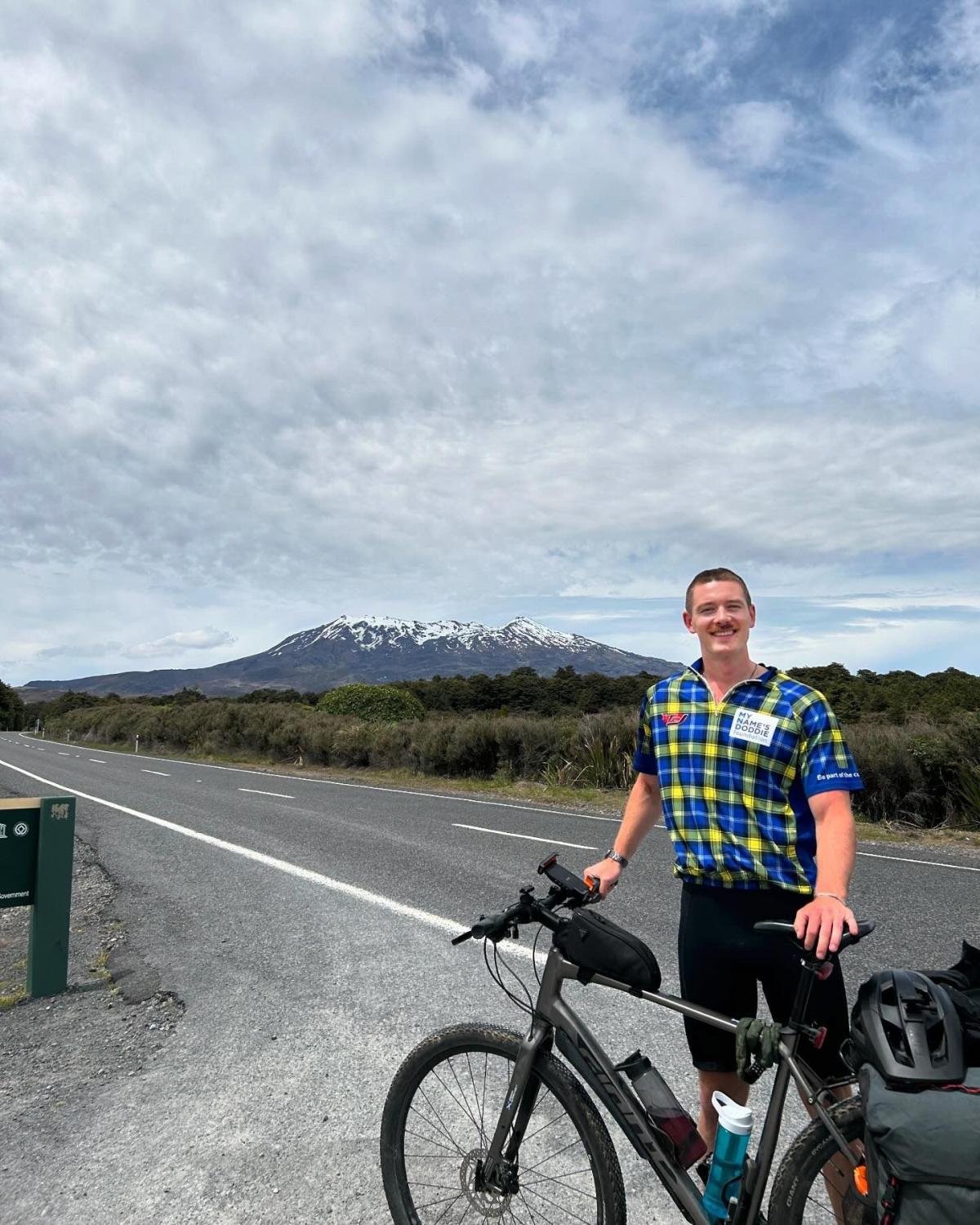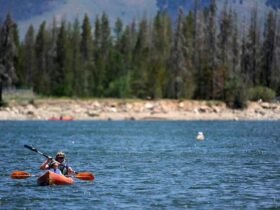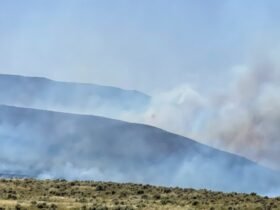His bike is a sleek Giant SLR 2, affectionately called Solera. She’s pretty reliable, but has given him a bit of grief recently, breaking down in Nelson and needing the bottom bracket and the chain replaced, along with a quick grease-up.
So far, Andy has travelled about 2200km. He has roughly 800km more to go.
Andy is cycling the length of New Zealand to raise funds for the My Name’5 Doddie Foundation. This charity, inspired by the legacy of Doddie Weir, supports vital research into motor neurone disease (MND) and provides support to families affected by this cruel disease.
I met Andy about two years ago on a chaotic flight from Munich to Los Angeles during a brutal snowstorm that had grounded most of Western Europe. Stranded for days, luggage lost, and utterly drained, I was relieved to spot his black and silver New Zealand passport — at least someone else was in the same boat (flight?).
Over the next 25 hours, fuelled by aeroplane wine and Pictionary, we became friends, helping each other survive the ordeal of LAX.
What on earth motivated Andy to cycle from Bluff to Cape Reinga?
“At 28,” Andy says, “I felt I had hit a bit of a lull. A lot of my friends were buying houses, settling down with partners or committing to their careers. I knew I wasn’t ready for this, but I realised that the time to live my life before committing to such milestones was running out. I knew I had to act now or I’d regret it.”
In preparation for this challenge, Andy shaved off his Hugh-Grant-esque “curtains” and is now sporting a close-shave more akin to Eminem (although he refuses to bleach it blonde, despite my repeated requests). He has a lovely blue-and-gold tartan shirt from the My Name’5 Doddie Foundation, and a pair of carefully-packed saddle bags.
Andy’s mum is a Kiwi, and he has always idolised the All Blacks. However, growing up in Scotland, he was also a staunch fan of the Scottish rugby team. One player in particular piqued his interest: Doddie Weir. Weir was a legendary figure in rugby, earning 61 caps for Scotland, representing the British and Irish Lions on their victorious 1997 tour of South Africa, and winning championships with Melrose and Newcastle Falcons. Weir’s achievements on the pitch marked “the start of my rugby memory”, says Andy.
In 2016, Weir was diagnosed with motor neurone disease.
“I continued to watch Scotland rugby,” says Andy, “and was increasingly drawn in by the incredible work the charity does in raising awareness and finding a cure for MND. I was inspired by Doddie’s strength in battling this disease as well as the community, both within and with out rugby, that was united in supporting those affected by MND.”
Motor neurone disease is truly a devastating disease — a neurological condition that attacks the nerves (motor neurons) of the brain and spinal cord responsible for controlling voluntary muscle movement. As these neurons deteriorate, the signals they send to muscles become disrupted, leading to symptoms such as limb weakness, speech and swallowing difficulties (dysarthria and dysphagia), muscle twitching or stiffness, and, over time, challenges with breathing as respiratory muscles weaken.
The progression of MND varies between individuals, but it is often a rapidly advancing condition, with most people living 2–5 years after diagnosis (though rare cases, such as Stephen Hawking, demonstrate significantly longer survival).
Scientists do not fully understand the causes of MND. The disease may arise from a combination of genetic and environmental factors. There is not yet a cure for MND, although some treatments (such as the drug Riluzole) can help manage symptoms and improve quality of life.
The challenges on Andy’s journey have been both physical and mental in nature.
“Physically,” he says, “the toughest day was definitely the Maungatapu Track between Nelson and Pelorus Bridge. It was 25°C and not a cloud in the sky. Under most circumstances that would be perfect, but when cycling or pushing your fully laden bike up nearly 800m of steep elevation, it was the toughest physical thing I have ever done.”
Andy has also been challenged by being on his own for long periods of time.
“In the South Island where there are fewer people around, I would sometimes go two or three days without having conversations with anyone, other than the occasional passing hello. To fight the feelings of being lonely, or to become disillusioned with the motivations behind my cycle, has been a challenge I had not expected quite so much.”
But thanks to “podcasts, music and lots of snacks”, Andy is doing well.
Andy is also grateful for the support and kindness of his family, friends and even strangers.
“Even the smallest amount of kindness from a stranger has an exponentially positive impact on my mood and desire to keep going. I have found the New Zealand people are very generous in their support and guidance, and are always willing to have a chat or help out.”
Andy is looking forward to cycling the Karangahake Gorge, a sharply winding canyon that I used to cycle daily in order to get to my waitressing job at the Waikino Station Cafe.
He particularly enjoyed cycling the west coast of the South Island: “It was incredibly beautiful with the road carved on to the side of the mountains with a steep drop to the sea below. It was both thrilling and frightening.”
Cycling through the Tongariro National Park was also a highlight.
“It was awe-inspiring. I could feel the presence of these volcanoes wherever I went in the area. I couldn’t stop looking at them and marvelling at their wonder.”
Andy’s journey is more than a mere fundraiser or a fun way to while away the summer hours. It’s an extraordinary testament to hope, compassion and determination — that of Andy himself, the countless sufferers of MND, their families and loved ones, and the diligent researchers doing their best to find a cure.
“I’d like to thank my friends and family for their messages of support and their donations,” he said.
“I’d also like to thank the people of New Zealand for being so generous in helping a stranger out on their endeavour. Many strangers have now become friends and, without them, I would not have been able to achieve this challenge.”
Finally, I ask him what he plans to do once he finishes the ride. “Take a long bath,” he says.
He will have deserved it.
— Jean Balchin is an ODT columnist who has started a new life in Edinburgh.













Leave a Reply